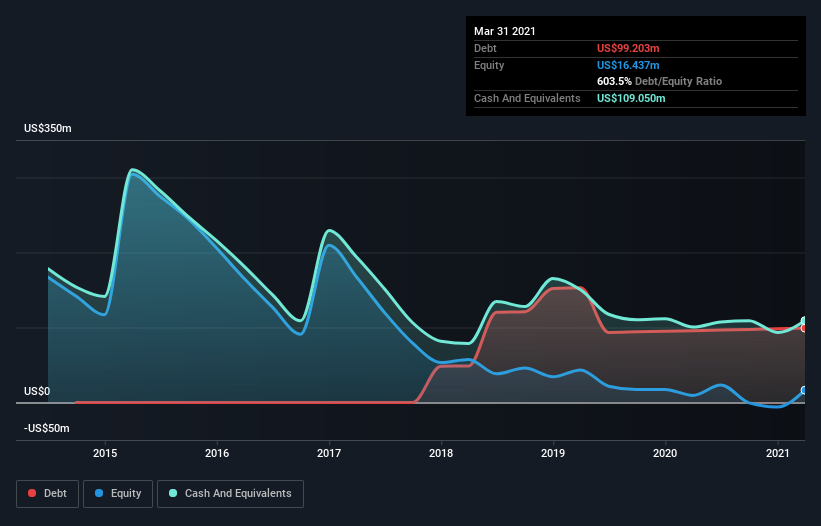We Think Puma Biotechnology (NASDAQ:PBYI) Is Taking Some Risk With Its Debt
Legendary fund manager Li Lu (who Charlie Munger backed) once said, 'The biggest investment risk is not the volatility of prices, but whether you will suffer a permanent loss of capital.' It's only natural to consider a company's balance sheet when you examine how risky it is, since debt is often involved when a business collapses. We can see that Puma Biotechnology, Inc. (NASDAQ:PBYI) does use debt in its business. But is this debt a concern to shareholders?
When Is Debt A Problem?
Debt is a tool to help businesses grow, but if a business is incapable of paying off its lenders, then it exists at their mercy. If things get really bad, the lenders can take control of the business. However, a more frequent (but still costly) occurrence is where a company must issue shares at bargain-basement prices, permanently diluting shareholders, just to shore up its balance sheet. By replacing dilution, though, debt can be an extremely good tool for businesses that need capital to invest in growth at high rates of return. The first thing to do when considering how much debt a business uses is to look at its cash and debt together.
See our latest analysis for Puma Biotechnology
What Is Puma Biotechnology's Net Debt?
The chart below, which you can click on for greater detail, shows that Puma Biotechnology had US$99.2m in debt in March 2021; about the same as the year before. But on the other hand it also has US$109.1m in cash, leading to a US$9.85m net cash position.
How Strong Is Puma Biotechnology's Balance Sheet?
The latest balance sheet data shows that Puma Biotechnology had liabilities of US$140.4m due within a year, and liabilities of US$101.8m falling due after that. Offsetting this, it had US$109.1m in cash and US$26.2m in receivables that were due within 12 months. So its liabilities total US$107.0m more than the combination of its cash and short-term receivables.
While this might seem like a lot, it is not so bad since Puma Biotechnology has a market capitalization of US$399.6m, and so it could probably strengthen its balance sheet by raising capital if it needed to. However, it is still worthwhile taking a close look at its ability to pay off debt. Despite its noteworthy liabilities, Puma Biotechnology boasts net cash, so it's fair to say it does not have a heavy debt load!
Notably, Puma Biotechnology made a loss at the EBIT level, last year, but improved that to positive EBIT of US$24m in the last twelve months. The balance sheet is clearly the area to focus on when you are analysing debt. But ultimately the future profitability of the business will decide if Puma Biotechnology can strengthen its balance sheet over time. So if you want to see what the professionals think, you might find this free report on analyst profit forecasts to be interesting.
Finally, a business needs free cash flow to pay off debt; accounting profits just don't cut it. While Puma Biotechnology has net cash on its balance sheet, it's still worth taking a look at its ability to convert earnings before interest and tax (EBIT) to free cash flow, to help us understand how quickly it is building (or eroding) that cash balance. Looking at the most recent year, Puma Biotechnology recorded free cash flow of 33% of its EBIT, which is weaker than we'd expect. That weak cash conversion makes it more difficult to handle indebtedness.
Summing up
Although Puma Biotechnology's balance sheet isn't particularly strong, due to the total liabilities, it is clearly positive to see that it has net cash of US$9.85m. So while Puma Biotechnology does not have a great balance sheet, it's certainly not too bad. There's no doubt that we learn most about debt from the balance sheet. But ultimately, every company can contain risks that exist outside of the balance sheet. For instance, we've identified 2 warning signs for Puma Biotechnology that you should be aware of.
When all is said and done, sometimes its easier to focus on companies that don't even need debt. Readers can access a list of growth stocks with zero net debt 100% free, right now.
This article by Simply Wall St is general in nature. It does not constitute a recommendation to buy or sell any stock, and does not take account of your objectives, or your financial situation. We aim to bring you long-term focused analysis driven by fundamental data. Note that our analysis may not factor in the latest price-sensitive company announcements or qualitative material. Simply Wall St has no position in any stocks mentioned.
Have feedback on this article? Concerned about the content? Get in touch with us directly. Alternatively, email editorial-team (at) simplywallst.com.



